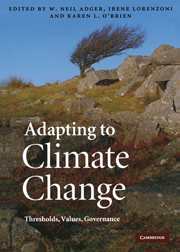Book contents
- Frontmatter
- Contents
- List of contributors
- Preface
- 1 Adaptation now
- Part I Adapting to thresholds in physical and ecological systems
- Part II The role of values and culture in adaptation
- Part III Governance, knowledge and technologies for adaptation
- 20 Whether our levers are long enough and the fulcrum strong? Exploring the soft underbelly of adaptation decisions and actions
- 21 Decentralized planning and climate adaptation: toward transparent governance
- 22 Climate adaptation, local institutions and rural livelihoods
- 23 Adaptive governance for a changing coastline: science, policy and publics in search of a sustainable future
- 24 Climate change, international cooperation and adaptation in transboundary water management
- 25 Decentralization: a window of opportunity for successful adaptation to climate change?
- 26 Adapting to climate change in Sámi reindeer herding: the nation-state as problem and solution
- 27 Limits to adaptation: analysing institutional constraints
- 28 Accessing diversification, networks and traditional resource management as adaptations to climate extremes
- 29 Governance limits to effective global financial support for adaptation
- 30 Organizational learning and governance in adaptation in urban development
- 31 Conclusions: Transforming the world
- Index
- References
20 - Whether our levers are long enough and the fulcrum strong? Exploring the soft underbelly of adaptation decisions and actions
Published online by Cambridge University Press: 31 August 2009
- Frontmatter
- Contents
- List of contributors
- Preface
- 1 Adaptation now
- Part I Adapting to thresholds in physical and ecological systems
- Part II The role of values and culture in adaptation
- Part III Governance, knowledge and technologies for adaptation
- 20 Whether our levers are long enough and the fulcrum strong? Exploring the soft underbelly of adaptation decisions and actions
- 21 Decentralized planning and climate adaptation: toward transparent governance
- 22 Climate adaptation, local institutions and rural livelihoods
- 23 Adaptive governance for a changing coastline: science, policy and publics in search of a sustainable future
- 24 Climate change, international cooperation and adaptation in transboundary water management
- 25 Decentralization: a window of opportunity for successful adaptation to climate change?
- 26 Adapting to climate change in Sámi reindeer herding: the nation-state as problem and solution
- 27 Limits to adaptation: analysing institutional constraints
- 28 Accessing diversification, networks and traditional resource management as adaptations to climate extremes
- 29 Governance limits to effective global financial support for adaptation
- 30 Organizational learning and governance in adaptation in urban development
- 31 Conclusions: Transforming the world
- Index
- References
Summary
Give me a lever long enough,
and a fulcrum on which to place it,
and I shall move the world.
Archimedes (287 BC – c. 212 BC)Introduction
Much of the focus in social science adaptation research in the climate and global change arena to date has focused on the international policy framework, national-level to place-based strategies in general, technological options and specific adaptation actions that can be employed by actors at any level of decision-making. By far the strongest emphasis has been on what potentially could be done, whether the necessary capacity for adaptation is in place, and – if wanting – how to enhance it (Smit et al., 2001; Adger et al., 2007). A much smaller number of investigators has looked at historical examples of successful or failed adaptation (from the cultural to local levels). Only in the last few years has there been a growing interest in the degree to which adaptation to anthropogenic climate change is already occurring, and if not, why not (see Adger et al., 2007). This line of work in particular, together with critical analyses of the socio-economic and political power dynamics and inequity issues underlying vulnerability and adaptive capacity (for example Adger et al., 2001, 2006) has brought us to the serious investigation of barriers and limits to adaptation that is the focus of this book and the conference preceding it.
- Type
- Chapter
- Information
- Adapting to Climate ChangeThresholds, Values, Governance, pp. 313 - 334Publisher: Cambridge University PressPrint publication year: 2009
References
- 17
- Cited by



